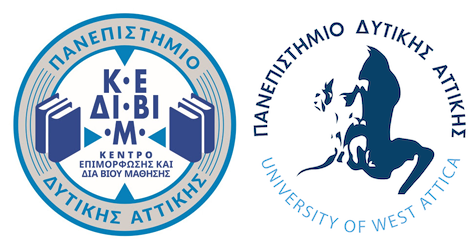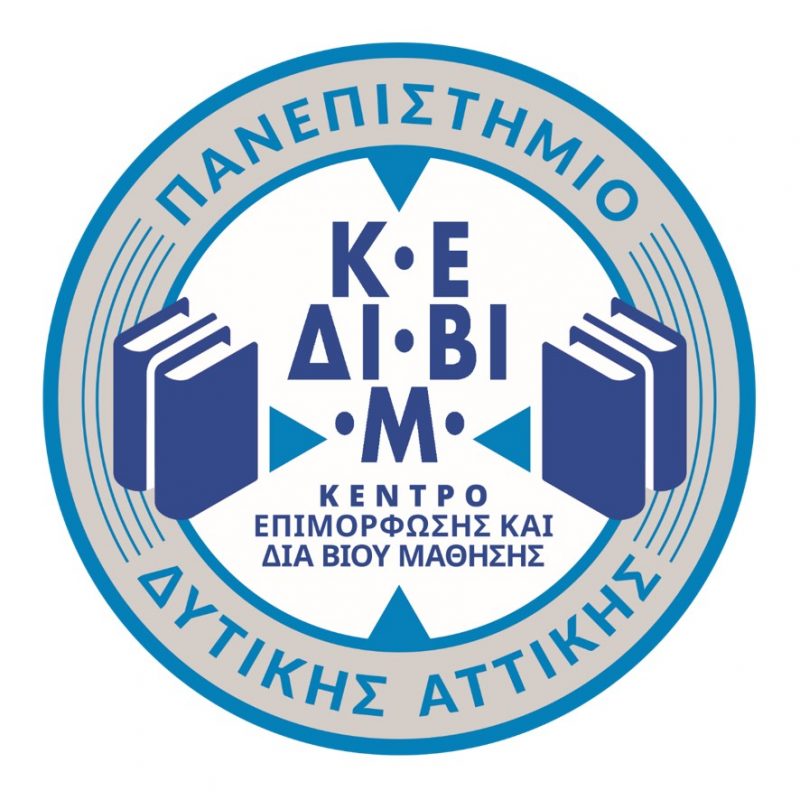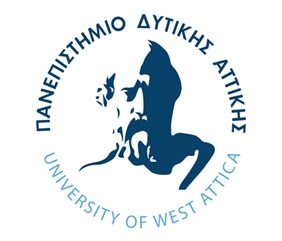Quality Policy
Quality Policy of the Training and Lifelong Learning Center of the University of West Attica (UNIWA)
The Training and Lifelong Learning Center (K.E.DI.VI.M.) of the University of West Attica (UNIWA) implements a quality policy as part of its strategy, which has been developed within the framework of the strategic planning of the Institution and its Internal Quality Assurance System.
The quality policy of the Training and Lifelong Learning Center (K.E.DI.VI.M.) covers all its activities and aims to achieve its mission and objectives in organizing and conducting high-level programs in continuing education, training, and lifelong learning, which meet the needs of citizens for acquiring additional knowledge and skills. These programs contribute to personal development, renewal, and adaptation to technological, economic, geopolitical, social, legal, and cultural developments, while promoting active participation in the labor market.
The quality policy followed by the Training and Lifelong Learning Center (K.E.DI.VI.M.) of UNIWA supports the development of a quality culture, through which the clear commitment of the Center and its Administration to quality assurance is ensured and disseminated. Through this, all involved parties—Management and staff of the Center, Scientific and Academic Directors, instructors, external collaborators, and trainees—take responsibility for quality assurance to the extent that pertains to them. This policy is official, binding, and fully connected to the legal and regulatory framework governing the operation of the Institution, it is reviewed annually by the Center’s Council, and may be revised if necessary.
This quality policy of the Training and Lifelong Learning Center (K.E.DI.VI.M.) primarily supports:
- The organization of the internal quality assurance system of the Training and Lifelong Learning Center (K.E.DI.VI.M.)
- The assumption of responsibilities by the leadership of the Institution, responsible individuals, and bodies of the Training and Lifelong Learning Center (K.E.DI.VI.M.), instructors, trainees, and staff, as well as their roles in implementing quality assurance.
- Public accountability and safeguarding academic principles and ethics.
- Humanitarian principles and respect for citizens’ rights in accordance with the Human Rights established by international organizations and the Constitutional Rights of the Citizen.
- Prevention of any discrimination related to color, gender, age, nationality, ideology, personal life choices, religion, or any form of violence.
- Encouragement of external parties’ participation in the quality assurance of the Training and Lifelong Learning Center (K.E.DI.VI.M.)
- The continuous improvement of learning and teaching, the rational structure of educational and training programs in line with the rules of science and art, their connection to the labor market, and their academic prospects.
- Effective organization of services, the development and maintenance of infrastructure.
- The provision and effective management of necessary resources for its operation.
- The development and rational allocation of human resources.
The implementation of the quality goals of the Training and Lifelong Learning Center (K.E.DI.VI.M.) will result in:
- Achieving the strategic goals of the Training and Lifelong Learning Center (K.E.DI.VI.M.), as set by the Management of the Center in the context of the Strategy of the Center and the Institution.
- Effective Management of the Center through the establishment of specific quality goals and commitment to their implementation.
- Promotion of active participation by all involved parties in the application and improvement of the Quality Management System, with the ultimate goal of making Quality a part of their culture.
- Continuous upgrading of the quality of services provided.
- Organization and implementation of high-level programs in continuing education, training, and lifelong learning.
- Development of modern teaching methods, including distance learning, and the promotion of the use of new technologies.
- Ensuring highly skilled teaching staff and the design and production of high-quality e-learning material.
- Transparency and adherence to the regulatory framework governing the operation of the Training and Lifelong Learning Center (K.E.DI.VI.M.) and the implementation of its programs by all involved members.
- Utilization of alternative funding sources.
- Strengthening actions for external engagement and internationalization of the Training and Lifelong Learning Center (K.E.DI.VI.M.) and highlighting its work.
- Development of synergies with society, scientific, social, and professional bodies, local government entities, educational bodies, and recognized lifelong learning organizations in both the public and private sectors.
- Utilizing evaluations from trainees regarding the offered programs.
- Increasing trust in the knowledge, skills, and abilities of graduates.
- Providing opportunities for access to lifelong learning for all, with targeted special actions for further education or updating the knowledge and skills of disadvantaged citizens as a means of facilitating their social inclusion.
- Simplifying administrative procedures.
- Strengthening research actions.
- Fostering environmental consciousness, innovation, entrepreneurship, and the development of Social Economy.
The Management of the Training and Lifelong Learning Center (K.E.DI.VI.M.) (Council & President) undertakes responsibility to contribute:
- To the formulation of the strategic planning of the Training and Lifelong Learning Center (K.E.DI.VI.M.), which is connected with the strategy of the Institution and specialized in the fields of lifelong learning, as well as aligning the quality policy with the strategic goals of the Center.
- To the commitment of everyone involved to comply with the legal and regulatory framework of the Institution and the specific provisions for the organization and operation of the Training and Lifelong Learning Center (K.E.DI.VI.M.)
- To continuous monitoring and control of the implementation of quality goals, as well as monitoring, comparative, and longitudinal analysis of performance indicators aimed at decision-making and the undertaking of corrective or improvement actions.
- To the establishment, review, redesign, and redefinition of the specific quality goals for lifelong learning programs, which must be fully aligned with the strategy of the Institution.
- To the documentation and dissemination of quality assurance procedures to the involved parties.
Public Disclosure of the Quality Policy
The policy is posted on the Center’s website, periodically sent to all members of the Academic Community, to the Scientific and Academic Directors when new programs are established, and to trainees before the start of their training cycle. It is also communicated at workshops, conferences, and meetings with professional, research, social, environmental, and cultural bodies.



